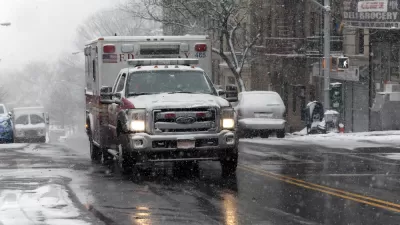The number of single households has grown three-fold since the 1950s. More sustainable and more likely to live in cities than married households, singles experience a major problem: metro areas are not planned for them but for nuclear families.
Eric Jaffe, with assistance from Devajyoti Deka of the Alan M. Voorhees Transport Centre at Rutgers University, writes about "people living alone", who he dubs "solos" (not to be confused with the transportation version: solo drivers or commuters) or singletons. According to Deka, "when it comes to housing and travel preferences, solos tend to live more sustainable lifestyles", with sustainability measured in terms of:
- Rented apartments over detached single-family-homes
- Commuting shorter distances
- Using public transit more often
One reason for the urban preference for solos is that they make more money and have more employment flexibility in cities.
But here's the paradox: "modern metro areas were largely planned and designed with the nuclear family in mind," says Jaffe. Today 28% of all households are solos. If cities want to attract solos, Deka has two recommendations:
- "Promote and enhance public transportation"
- Recognize that "contrary to much popular belief, there are twice as many elderly solos (above 65) than young ones (18 to 34)." [Perhaps that's why "solos" is used rather than the younger-sounding "singles"]. Housing choices are key: Single-occupancy-studio rentals can play a vital role
Dr. Deka's paper, "The Living, Moving and Travel Behaviour of the Growing American Solo: Implications for Cities", was published July 05 in Urban Studies. The abstract is available free, while the text requires a subscription to Urban Studies.
Readers may recall that the growing numbers of singletons was the topic of NYU sociology professor Eric Kleinberg's 2012 book, "Going Solo"; four articles on it can be accessed below under "Related".
FULL STORY: The Rise of People Living Alone Has Led to More Sustainable Cities

Maui's Vacation Rental Debate Turns Ugly
Verbal attacks, misinformation campaigns and fistfights plague a high-stakes debate to convert thousands of vacation rentals into long-term housing.

Planetizen Federal Action Tracker
A weekly monitor of how Trump’s orders and actions are impacting planners and planning in America.

Chicago’s Ghost Rails
Just beneath the surface of the modern city lie the remnants of its expansive early 20th-century streetcar system.

Bend, Oregon Zoning Reforms Prioritize Small-Scale Housing
The city altered its zoning code to allow multi-family housing and eliminated parking mandates citywide.

Amtrak Cutting Jobs, Funding to High-Speed Rail
The agency plans to cut 10 percent of its workforce and has confirmed it will not fund new high-speed rail projects.

LA Denies Basic Services to Unhoused Residents
The city has repeatedly failed to respond to requests for trash pickup at encampment sites, and eliminated a program that provided mobile showers and toilets.
Urban Design for Planners 1: Software Tools
This six-course series explores essential urban design concepts using open source software and equips planners with the tools they need to participate fully in the urban design process.
Planning for Universal Design
Learn the tools for implementing Universal Design in planning regulations.
planning NEXT
Appalachian Highlands Housing Partners
Mpact (founded as Rail~Volution)
City of Camden Redevelopment Agency
City of Astoria
City of Portland
City of Laramie




























